Thanks to generous funding from donors to a 2019 Hornraiser crowdfunding effort and support from UT Libraries, I was able to visit Korea and Taiwan in October. In this blog post, I highlight the Korea portion of my trip—if you’d like to learn more about Taiwan, just ask! I’m happy to share my experience with all interested! While in Korea, I was able to do much of my usual liaison librarian work but with considerably increased efficiency and depth because I was “in context.” For example, I was able to (re)connect with vendors, to attend scholarly and cultural events, and to participate in conferences, all related to and in support of the Korean Studies programs here at UT.
The primary focus of my trip was to attend the “2019 Overseas Korean Studies Librarian Workshop” sponsored by and held at the National Library of Korea (NLK) in Seoul on from October 14-17.I arrived in Korea a week before the workshop so that my colleague Julie Wang of SUNY Binghamton Libraries and I could attend the 24th Busan International Film Festival, one of the most significant film festivals in Asia, to visit vendors, and to meet with the Korea Foundation. At the film festival, we were lucky to have the opportunity to listen to a group of rising documentary Asian directors about their films—films in all languages not just Korean.
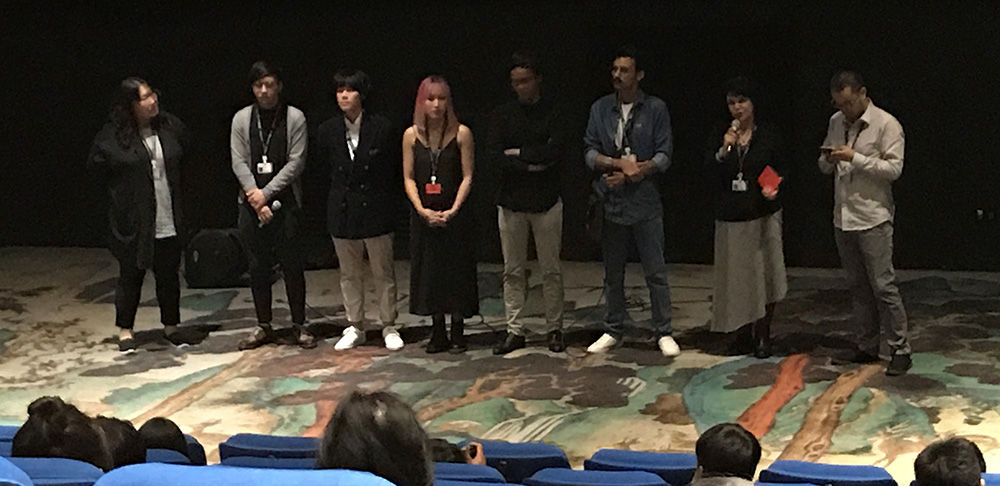
We also visited our database vendors KSI and Nurimedia to learn of their current programs and future plans. We were delighted to learn that KSI is working on an English interface for its database KISS and that they expected to launch it in the summer 2020. (Nurimedia’s database DBpia & KRpia already have English interfaces.) Along the way, we were joined by Wen-ling Liu of Indiana University and the three of us U.S.-based librarians to visit the Korea Foundation (KF). The Korea Foundation has been partially supporting our subscription of KSI and Nurimedia’s e-resources and providing the Library with print materials, both through annual grant applications. The Foundation headquarters is in Jeju Island (a 70-minute-flight away from Seoul) and so we were particularly grateful that three of the Foundation staff flew in to Seoul to meet with us, explain their programs, and listen to our concerns.
The following week, we were all participants in the “Overseas Korean Studies Librarian Workshop,” a workshop generously funded by the National Library of Korea. This workshop is designed for overseas librarians who are non-Korean-native and whose job responsibilities include Korean subject areas. Participants came from ten countries (in three continents!), including 17 librarians from academic, national, public and theological seminary libraries and one art historian from a university. None of the participants is solely a Korean studies librarian; in fact, a lot of us are East Asian or Asian studies librarians whose responsibilities also cover Korean studies. Only a few participants have “adequate” Korean language skills, most of us have very limited or not any Korean language skills.
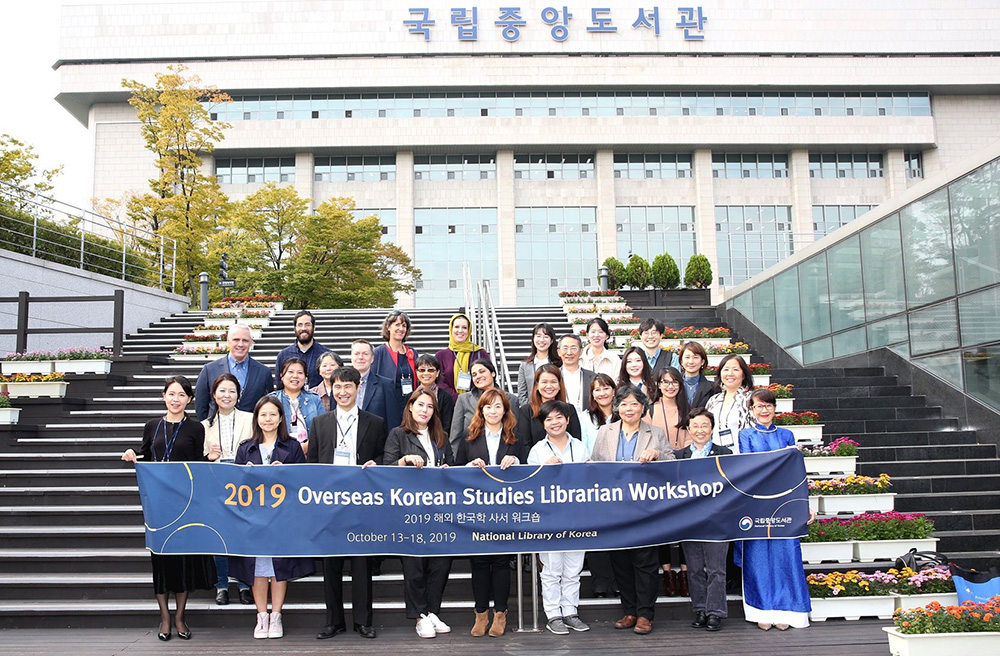
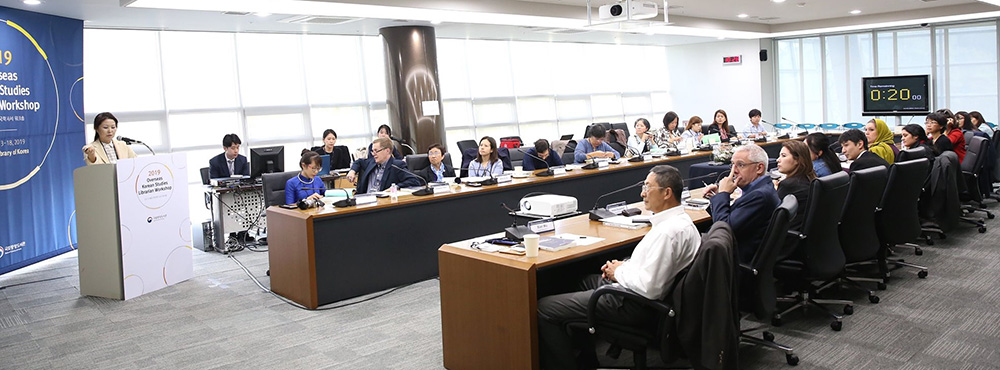
At the workshop, the National Library of Korea (NLK) introduced us to its digitization projects and services. Since 1982, it has been working with oversea libraries (China and Japan as well as western countries), local organizations, and private collections to digitize Korean rare books and to provide metadata and services through KORCIS: Korean Old and Rare Collection Information System. Currently, there are over 50,000 titles in KORCIS.
NLK also offers various international exchange & cooperation programs, the most notable is its “Window on Korea” (WOK). As of October 2019, NLK has signed MOUs with 25 overseas libraries for this program. To each WOK library, NLK provides funding for equipment (computers, chairs and desks, signboard etc.) in addition to 1500-4000 volumes of Korean books over a five year period. The mission of the WOK project is to introduce foreign researchers and ordinary library users to the history, tradition, culture, language and literature of Korea as well as Korea’s new achievements in the field of information technology. I’m hopeful that UT Libraries might pursue an MOU with the Window on Korea program one day!
All workshop participants—including me!– gave presentations about Korean studies and Korean library resources at their home institutes or countries. This was one of the most interesting and valuable parts of the workshop for me. I regularly meet with our US colleagues at conferences but I rarely have opportunity to learn of Korean studies and Korean library resources in other part of the world. For example, I heard about Korean Studies programs in Uzbekistan, France, Russia, Germany and beyond!
The memorable farewell dinner party was held at a traditional Korean building where we all changed to hanbok (traditional Korean dress). As you can see, people were having fun and wanted to take lots of photos in hanbok!
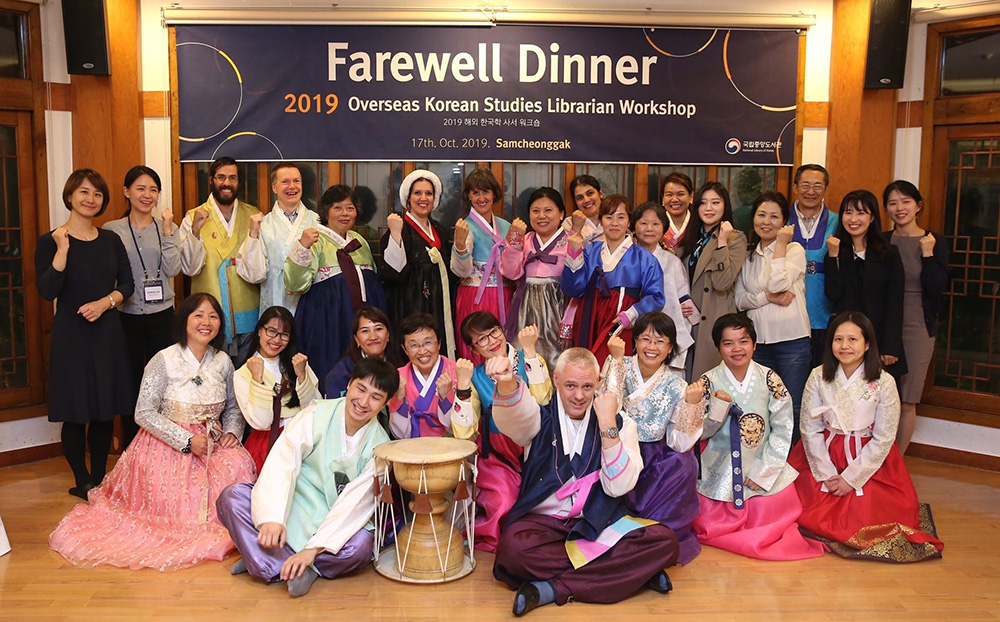
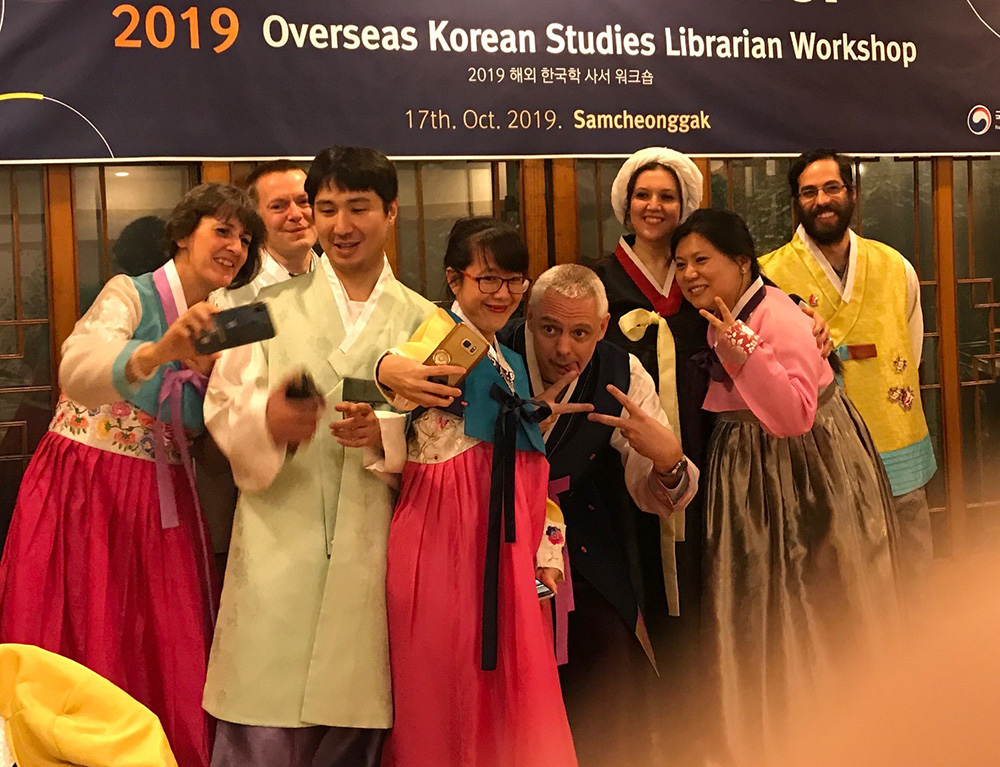
The cultural tours took us to National Hangeul (or Hangul) Museum and National Museum of Korea. At the Hangeul Museum, we used hammers to punch letters into leather to inscribe our hangul names. We also made a book from block printing and in traditional Korean binding. This kind of hands-on project reminded me of our own maker-spaces here at UT such as the Foundry.
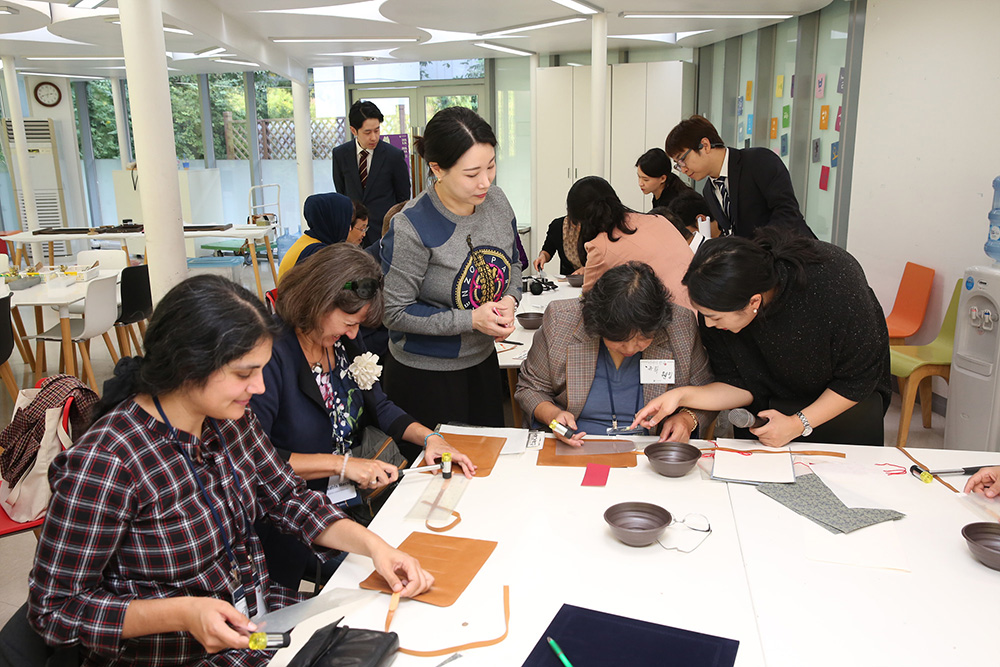
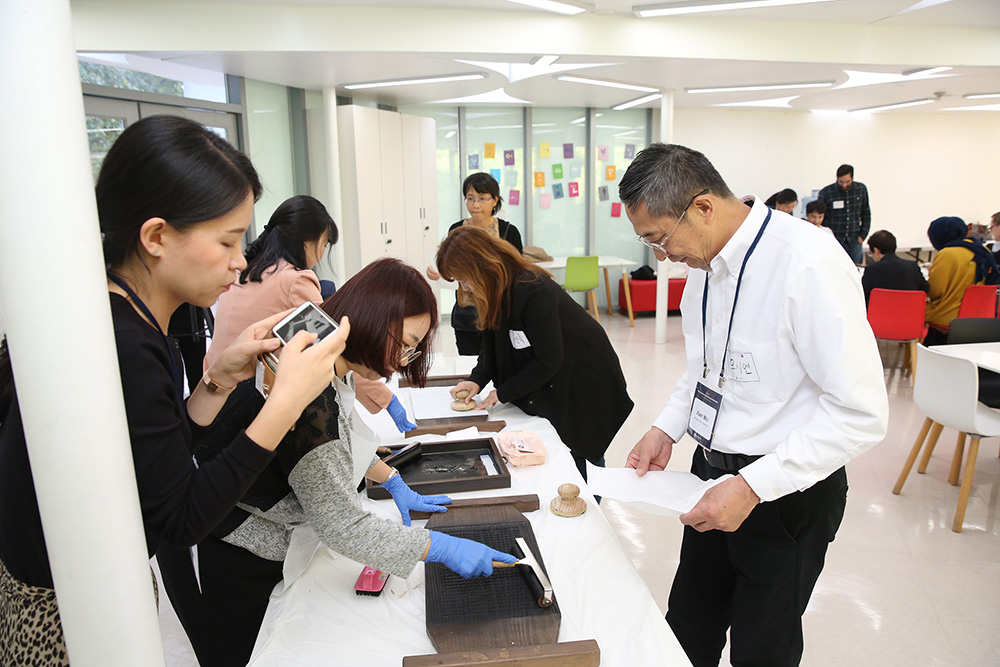
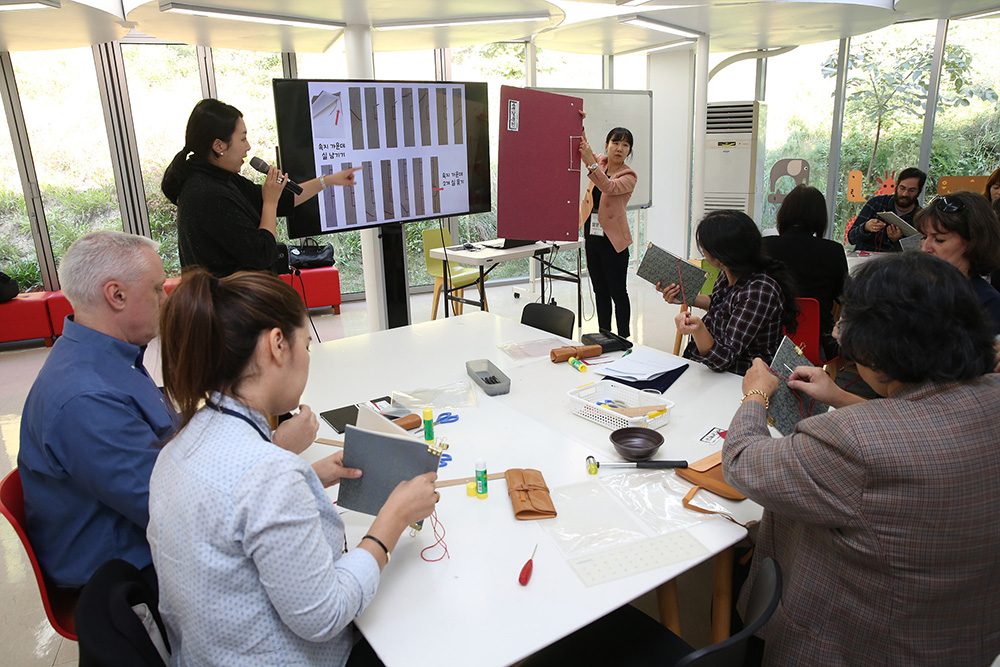
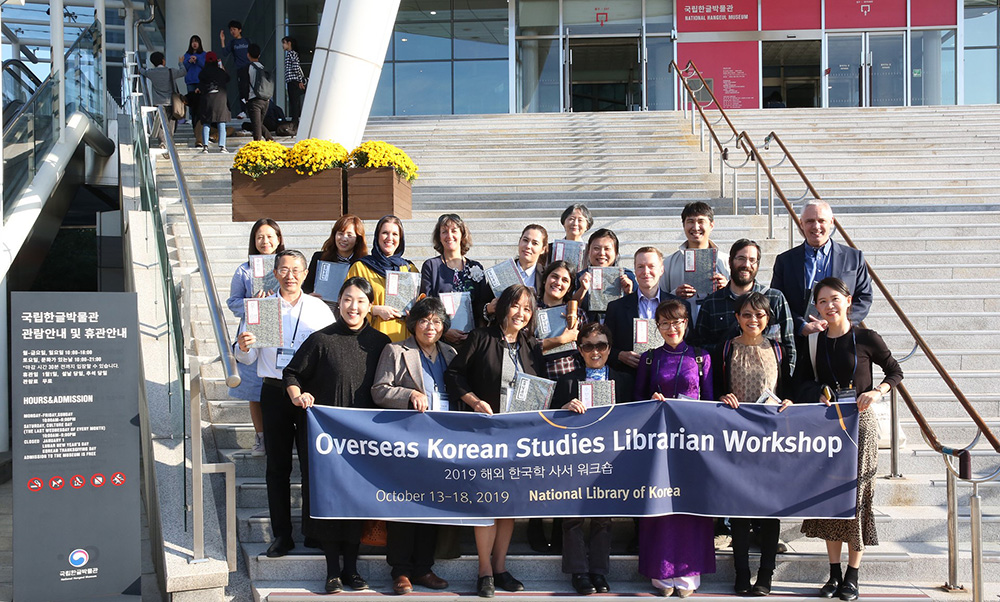
All eighteen participants stayed in the same hotel and had every meal together. The workshop provided a rare opportunity for participants to really get to know our fellow Korean librarians from across the world. We have learned from one another not only from the formal presentations, but also from chatting and discussions at each meal and on bus trips. At the end of the workshop, we all had become old friends. We have created a mailing list and have since begun to communicate with one another. Because of this unique experience, I now know whom to turn to especially when there are difficult questions involving Korea/Korean and the countries where my fellow participants come from.
My trip was made possible by funding from Hornraiser donors. Thanks to their generosity, I was able to fly to and from Seoul (and Taiwan for another workshop) and to extend my trip in Korea to attend the Busan Film Festival and to visit our vendors and sponsor.
